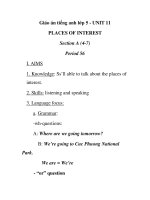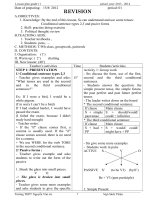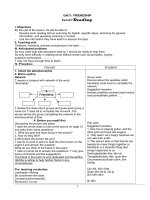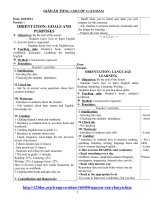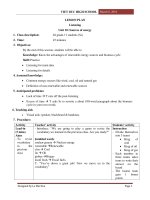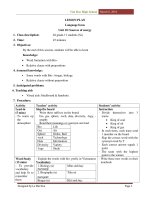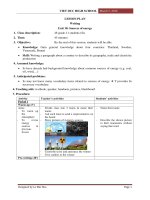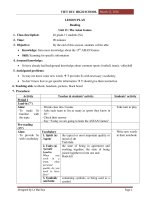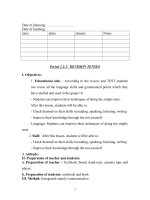GIAO AN BAM SAT 11 2011 GIÁO ÁN TIẾNG ANH LỚP 11
Bạn đang xem bản rút gọn của tài liệu. Xem và tải ngay bản đầy đủ của tài liệu tại đây (422.88 KB, 79 trang )
Period :1
Date: 15/8/2011
GIÁO ÁN BÁM SÁT 11
GRAMMAR: INFINITIVE WITH TO.
I. Aims: After the lesson, sts can be able to use exactly the verb with to.
II. Language content:
1. Grammar: Infinitive with to.
2. Vocabulary: all new words in the lesson.
III. Techniques: inductive method.
IV. Teaching aid: model.
V. Proceduce:
Teacher’ and sts’ activeties
Sts listen and write down then give some
examples.
Ex: I want to learn English well.
She wants him to leave.
Content
II. Greeting.
III. Today’s lesson.
Grammar.
1. Presentation:
A. Infinitive with to / To-infinitive:
a. Một số động từ sau đây được theo
sau bởi To inf.
decide (quyết đònh)
hope (hy vọng)
manage (cố gắng, xoay sở)
promise (hứa)
seem (dường như)
start * (bắt đầu)
begin* (bắt đầu)
like* (thích)
+ (O)
love* (thích)
+ (O)
hate* (ghét)
+ (O)
+ Toinf.
ask (hỏi, yêu cầu)
+ (O)
expect (mong đợi)
+ (O)
help**(giúp đỡ)
+ (O)
intend (dự đònh)
+ (O)
invite (mời)
+ (O)
want (muốn)
+ (O)
wish (ước, muốn)
+ (O)
allow (cho phép)
+ O
advise (khuyên)
+ O
get
+ O
tell (bảo)
+ O
Example:
- We decided to make a trip to Dalak.
- She wants to have a cup of tea.
- My cousin wanted me to take her to
Eg: He told me not to go to class late.
Eg: It’s lovely to see you again.
Eg: I have some letters to write.
Eg: They aren’t allowed to go out now.
Eg: It was very kind of you to help me.
Ex: I explained how to use the computer.
Eg: She studies English to talk to foreigners.
Eg: To save money now is necessary.
Eg: It takes many hours to come there.
Coming there takes many hours.
Ex: Our duty is to study well.
Ex: She was happy by his willingness to do
his share of the work.
Ex: He was the last student to leave the
class.
Sts work individual then change the ex with
1
the other to discuss about the ex.
T goes around and helps sts to do the ex.
Write on board and then correct.
T. supplies Ss with the cases in which
infinitives are used. (This is printed in
handouts delivered to Ss beforehand.)
Sts write down the grammar points and
begin doing the ex that were given by the
teacher.
Make sentences and then correct them one
by one.
the supermarket.
- My grandparents often advise me to
study hard.
* Lưu ý: + Động từ với * có thể được
theo sau bằng To infinitive hoặc V-ing
+ Động từ với ** có thể được
theo sau bằng To infinitive hoặc
Infinitive without to
b. To-infinitive có thể được dùng sau
một số tính từ chỉ những phản
ứng, và cảm giác của con người.
delighted (vui)
lovely (đáng u)
pleased (vui, hài lòng)
anxious (bồn chồn, lo lắng)
shocked (bò sock)
surprised (ngạc nhiên )
+
To inf
happy (hạnh phúc)
glad (vui, hân hạnh)
afraid (ngại)
sorry (lấy làm tiếc)
Example: I’m glad to come to your party
today.
c. To-infinitive có thể được dùng để
nói về mục đích, hoặc ý đònh làm
việc gì đó:
Example: She learns English to find a
good job
d.To-infinitive còn được dùng trong
các cấu trúc sau:
- TOO + adj + (for someone) + to inf.
- adj + ENOUGH + to inf.
Example: - The tea is too hot (for me)
to drink.
- He’s strong enough to lift
this stone.
To-infinitive cũng được dùng trong mẫu
câu với chủ từ giả “It”:
It is (not)
impossible
+ for
someone + to -inf.
easy
important
2
Sts do ex
1. she was the only girl . she wants to
pass the exam.
2. he doesn’t want to sing that song . He
is at the party .
3. the manager is busy . I want to meet
him
necessary
usual
Example: It’s impossible for him to find a
job now.
f. Chúng ta có thể sử dụng to
infinitive sau một số danh từ hoặc
đại từ như là một thành phần bổ
nghóa cho các danh từ hoặc đại từ đó
để thay thế cho một mệnh đề quan
hệ.
Example:
I have a lot of work to
do.
= I have a lot of work which I have
to do.
g. Những đại từ bất đònh như
something, anything, nothing và
những từ tương tự thường được theo
sau bởi “ for + O + to inf”
Example: There’s nothing for the cats
to eat.
1. Sau “for, of” + túc từ.
2. Sau từ nghi vấn: what, how, when,
who…
3. Chỉ mục đích và kết quả.
4. Làm chủ từ.
Tuy nhiên người ta ít dùng to V-inf làm chủ
từ, mà thường dùng chủ từ hình thức It đi
với to V-inf hoặc chủ từ V-ing.
5. Làm bổ ngữ sau động từ to be.
6. Sau một số danh từ: ability, anxiety,
attempt, decision,desire,
determination,effort, offer, plan,promise
wish ,refusal,request, pleasure…
7. Sau một số từ thứ tự (the first, the
second,…) sau (the next, the last, the
only,…) và sau so sánh nhất của tính từ.
IV. Practise.
Make some sentences by using verbs follow
with “to”.
1. She was the only girl to pass the
exam.
2. He refused not to sing a song at the
party.
3. They’ve arranged for me to meet the
manager.
V. Homework:
- Make 5 sentences by using the
3
-
Period: 2
Date: 22/8/2011
grammar point.
Learn by heart these verbs.
GRAMMAR: INFINITIVE WITHOUT TO.
I. Aims: Sts can know the verbs are used without “to” exactly.
II. Language content:
1. Grammar: Infinitive without “to”.
2. Vocabulary: all new words in the lesson.
III. Techniques: inductive method.
IV. Teaching aid: model.
V. Proceduce:
Teacher’ and sts’ activities
Sts do ex.
1. He invited her to go to the party.
2. Does he get anything to eat?
Correct.
-
Sts listen to the teacher’s explaining
and write down.
Give some examples.
Eg: He can speak three foreign languages.
Eg: You had better put your money in the
bank.
Eg: I saw the man walk across the street.
Eg: I hear somone knocking at the fornt
door.
Eg: He let them go home early.
Eg: Go to the blackboard
Eg: As for the housework, I do everything
except cook.
Eg: Why not stay for a while?
Eg: He helped me understand the
homework.
Content
II. Greeting.
III. Revision.
Make 2 sentences by using infinitive with to.
IV. Today’s lesson.
Grammar.
‘Infinitive without to”
These verbs without “to” are used in some
cases:
Sau các động từ hình thái như: can, could,
may, needn’t ,will, would, shall, should….
1. Sau had better (nên), would rather
(thích hơn).
2. Sau các động từ chỉ giác quan như:
see, hear, watch,…
Example:
- I feel the earth move.
- We watched Liverpool
and Manchester play on TV last night.
(xem heát traän ñaáu)
Để diễn tả hoạt động mà ta nhìn, thấy… từ
đầu đến cuối.
Để đề cập đến sự tiếp diễn của hoạt động.
3. Sau make/ let/ have somebody/
do/something bắt buộc, cho phép, yêu
cầu.
- Let sb do st = allow sb to do st.
- Make sb do st = force sb to do st.
Example:
- The film made me cry.
- Let me go!
4.Trong câu mệnh lệnh ở dạng khẳng
định.
5.Sau exept và but (ngoại trừ).
6.Sau why hoặc why not?
4
I was helped to understand the homework. Các động từ chỉ giác quan như: feel, hear,
see, watch…và make. Khi ở bị động phải
Eg: He helped her find the book.
dùng động từ nguyên mẫu có “to”.
He helped her to find the book.
- Động từ “help” có thể đi cùng với cả
hai dạng : động từ nguyên mẫu
không “to” và nguyên mẩu có “to”.
Eg: I got him to repair my bike.
- “Get” là động từ có ý nghĩa tương
đương với make(bắt buộc), have
(yêu cầu).
Nhưng động từ này phải kết hợp với động từ
nguyên mẫu có “to”.
V. Practice.
Complete each of the following
sentences with to-inf and/or inf
without to:
1. I’ve decided (buy)…… a new
apartment.
Sts work in pairs and discuss how to make
2. What time do you expect (arrive) ……
sentences correctly.
in Chicago?
- Write on board.
3. That T-shirt makes you (look) ……
- Check and correct.
younger.
Key :
4. Let me (post) …… that letter for you.
1. to buy
5. It’s important for students (do) ……
2. to arrive
their homework.
3. look
6. I promise you your order will (send).
4. post
.today.
5. to do
7. She went to the post office (buy) ……
6. send
some stamps.
7. to buy
8. He isn’t tall enough (reach) …the top
8. to reach
sheft.
9. to listen
9. We listened (sing) .. a song.
10. shout
10. I heard her (shout) …… at the children.
11. to go
11. It’s too cold for us (go) … swimming
12. to fly
today.
13. across
12. It takes 5 hours (fly) …… from Los
14. to do
Angerles to Honolulu.
15. to please
13. I saw her (across) …… the road.
16. to have
14. They have a lot of homework (do)
17. go
……..
18. leave
15. John is easy (please) ……
19. annoy
16. I’m sorry ( have troubled) ……you.
20. to stay
17. It’s late. I think we had better (go) …
21. to use
home.
22. to buy
18. We can (leave) …… soon.
23. to sit
19. Don’t let the children (annoy) …… you.
24. to join
20. We want (stay) …… home tonight.
25. cry
21. My father allowed me (use) … the
26. to come
camera.
27. to get
22. People use their money (buy) …… and
28. go shopping
(sell) …… things.
5
23. She asked us (sit)… down and went
(make) … some coffee.
24. Tim is too young (join) ………… the
army.
25. The movie was very sad. It made me
(cry)
26. Would you like (come) … to dinner on
Friday?
27. It took us three hours (get) …………
here.
28. I’d rather (go).. (shop) .. than anything
else.
Homework:
- Learn by heart these verbs.
Make 5 sentences by using the grammar
points.
Comment:
Date : 29/8/2011
Period : 3
GRAMMAR:
SIMPLE PRESENT TENSE, PRESENT CONTINUOUS TENSE, PRESENT
PERFECT TENSE.
I. Aims: Sts can use correctly these tenses in each sentence.
II. Language content:
1. Grammar: present, present continuous, present perfect tenses.
2. Vocalbulary: all new words.
III. Techniques: inductive method.
IV. Teaching aid: model.
V. Proceduce:
Teacher’ and sts’ activities
Content
I. Greeting.
II. Revision.
Ask sts to write some forms of three tenses.
Ask sts questions – Then answer.
- What do you often do in the
morning? – I do my ex.
- When he comes what are you doing?
– I’m learning.
- How long have you learned English?
Check and correct.
III.Today’s lesson.
Grammar:
1.Simple present tense.
-S V inf
s/es (ch, sh,ss,x,z,o )
-S don’t /doesn’t Vinf
-Do/Does S Vinf ?
Sts write down the grammar.
Sts to give some examples If they can.
Eg 1: The girl (always/ get) to school by
bus. – gets.
2. He (never/ leave) his house late. –
leaves.
6
3. They (play) football very well? – Do –
play.
Write down.
- Explaining the form.
- Listen and write down what the
teacher explains for the lesson.
-
Adverbs are always used: always, usually,
rarely,….
Usage: with reqular actions happen day by
day.
2.Present continous tense.
is
is
S am Ving ;
S am not Ving
are
are
Is
Am S Ving ?
Are
Usage:
Use the continous for something that
happening at or around the time of speaking.
The action isn’t finished.
Adverbs are used in the tense: now, right
now,at the moment …
Follow the imperative mood : look!, listen!,
Don’t …. , Please, ….
An action’ll happen in the future.
Give examples that helps sts
understand the lesson.
Eg: Can you hear those people? What they
(talk) about?
are – talking.
Hoa (stay) in bed now.
is staying.
Give some examples.
1. You (ever/ ride) a horse?
Have – ridden.
2. She (live) there since she (move) ti
London.
has lived – moved.
3. Since he (come), he (not/ talk) to
anyone.
came, hasn’t talked.
3. Present perfect tense.
S have / has PP
; S have/has not PP
Have/ Has S PP ?
Usage:
- When we talk about period of time
that continous from the past until
now, we use the tense with today, this
morning when these periods are not
finished at the time of speaking.
- Adverbs: just, already, not…yet,
never,…
IV. Consolidation.
1.
Use correct tense of verbs in
parentheses.
1. While she (cook) in the kitchen, she
(hear) a knock at the door now.
2. They (sit) in the park now.
3. Mary (finish) her work yet?
4. They (write) the lesson for 2 hours.
2. Choose the best answer.
1. I (did/ had done/ have done) ex since
I (came/ come/ have come) here.
2. He (listen/ is listening/ has listened)
to music at this time.
3. He can (sing/ is singing/ has sung)
English songs well.
V. Homework:
Write down and do ex
Teacher corrects the ex.
1. is cooking - hears.
2. are sitting.
3. has – finished.
4. have written.
Work in pairs and finish the ex given
1. have done – came.
2. is listening.
3. sing.
7
- Do ex again.
Learn by heart the form of tenses.
Comment:
Period : 4 GRAMMAR: PAST SIMPLE, PAST CONTINUOUS, PAST PERFECT
TENSES.
Date: 5/9/2011
I. Aims: With the tenses they learned, sts can know and use in each case.
II. Language content:
1. Grammar: past simple, past continuous, past perfect tenses.
2. Vocalbulary: all new words.
III. Techniques: inductive method.
IV. Teaching aid: model.
V. Proceduce:
Teacher’ and sts’ activities
Content
II. Greeting.
Sts do ex. T checks and correct.
III. Revision.
Correct tenses of verbs (10m).
1. Do – start.
1. They (start) lessons at 7:00 an every
morning?
2. is sleeping.
2. Don’t make noise! Our baby (sleep).
3. don’t help – is.
3. We (not/ help) her because she (be)
lazy.
4. am staying.
4. I (stay) in Grand hotel now.
IV. Today’s lesson.
T introduces some grammar points and asks Grammar:
sts to give ex.
1.Past tense
- Make sentences.
Form: S + V2 / V-ed
1. I (not/ enjoy) the film last night. –
Adverbs are always used: yesterday, last,
didn’t enjoy.
ago,…
8
2. It was warm, so I (take) of my coat. –
took.
3. How long she (stay) in Dalat last
summer? – Did she stay.
4. He (be) at home yesterday. – was.
Usage: Actions happened and finished at
that moment (some adverbs must be learnt
by heart when they use past tense)
Notice:
- The past of “to be” is.
• I, She, He, It: was.
Give some examples.
• You, We, They, name of two
1. This time last year I (live) in Brazil. –
persons: were.
was living.
2.Past continuous tense.
2. I waved to her but she (look) another
a. Form: S + was/ were + V-ing
way.-looked
b. Usage: talking about something
3. What you (do) when I phoned you? –
which was in progress at a past time.
were you doing.
The tense to say that someone was in the
middle doing something at a certain time.
Give some examples.
The action or situation had already started
1. By 2002 we had graduted form the
before this time but had not finished.
university.
3.Past perfect tense.
2. When sarah arrived at the party Paul
a. Form: S + had + PP
had already gone home.
Usage:
(T explained clearly about the tense)
•
Sometimes we talk about something
that happened in the past.
Work in pairs and discuss.
Adverbs:
by the time, after,before…
1. moved.
V. Consolidation.
A. Choose the best option.
1. Since his family (moves/ had moved/
moved) he has never gone home early.
2. He (told/ tells/ had told) me the news
3. told.
before you (talk/ talked/ had talked).
4. studied.
3.The teacher (told/ tells/ had told) him to
5.
think well before he answered.
3. He (studied/ studies/ had studied) at
Sts work in pairs to discuss.
7:00 yesterday.
1. When he was young, he used to play
B.
Complete these sentences.
football.
4. When/ he/ young/ he/ used to/ play/
2. I was drinking a cup of coffee when
football.
the phone rang.
5. I/ drink/ a cup of coffee/ when/
- Ss work in pairs to do the exercise.
phone/ ring.’
2.Practice:
I.Put the verbs in brackets into the past
- T. calls on some Ss to read their answers,
simple,
past perfect and past progressive:
and correct their answers if necessary.
1. He said he (join) …….. the army in
- Ss tell T. the forms and usage of the past
1985.
simple, past perfect and past progressive.
2. Bill (have) …….breskfast when I
Give the correct answer aftre they know
stopped at this house.
how to use
3. When I went back to the shop, they
Key:
(sell) …….. the book I wanted.
1. had joined
4. Hoe many countries they (visit) …..
2. was having
by March last year.
3. had sold
2. had told – talked.
9
4. visited
5. came – was talking
6 was lying-heard
7. rained- was sleeping
8. was planting- was change
9. arrived- were waiting
10. had done – worked
11 .was looking – started- took
12. sent- had received
13. met
14. had visited- went
15. had worked – retired
16. had washed- began
The teacher listen to the sts read those
sentences
And then correct them . Remember to
change their answers
Period: 5
Date:12/9/2011
I.
II.
1.
2.
III.
IV.
V.
5. When he (come) …….. home, I (talk)
…….. to my mother on the phone.
6. While I (lie) …….. in bed last night, I
(hear) …….. a strange noise in front
of the door.
7. It (rain) …….. heavily when I (sleep)
…….. yesterday afternoon.
8. While Mrs Smith (plant) ……..
flowers in the garden, Mr Smith
(change) …….. the oil in his car.
9. When we (arrive) …….. at the
airport, they (wait) …….. for us
there.
10. He (do) …….. a lot of jobs before he
(work) …….. in this company.
11. Yesterday while I (look) …….. at my
computer screen, I (start) ……. feel a
little dizzy, so I (take) ….. a break.
12. Susan (send) …….. a letter to her
university after she (receive) ……..
her scholarship check.
13. Tom (meet) …….. Mary in 1986 and
they have been good friends since
then.
14. After they (visit) …….. Paris, they
(go) …….. to Manchester.
15. George (work) …….. at the
university 45 years before he (retire)
……..
16. After Tom (wash) …….. his clothes,
he (begin) …….. to study.
VI. Homework:
Do ex again. Review all tenses
GRAMMAR: INFINITIVE AND GERUND.
Aims: Sts can distinguish with verbs are used inf or gerund by learning the lesson.
Language content:
Grammar: infinitive and gerund.
Vocalbulary: all new words.
Techniques: inductive method.
Teaching aid: Some hand outs with examples and questions.
Proceduce:
Teacher’ and sts’ activities
T checks and corrects.
Sts do ex.
1. Last summer his family spent their
holiday in NhaTrang.
Content
I. Greeting.
II. Revision.
Comeplete these sentences.
1. Last summer/ his family/ spend/
holiday/ Nha Trang.
10
2. Where did you meet her…?
-
T introduces some verbs and asks sts
to write down.
Sts must learn by heart all verbs and
do ex.
Give examples if sts understand the lesson
well
Eg:
-
This book is worth reading.
It’s no use/ good persuading him to
leave the city.
Work in pairs ,discuss the grammar and
make sentences that are used in each
situation
Check and correct .sts read loudly the
sentences they had done
He looks forward to seeing me again.
I often do the washing.
Eg: He doesn’t allow smoking here.
He doesn’t allow anyone to smoke here.
It started to rain/ raining as soon as we went
out.
I remember locking the door before I left.
Please remember to lock the door.
2. Where/ you/ meet/ her/ yesterday?
III. Today’s lesson.
A. Some verbs are followed by Gerund
(V – ing) enjoy, like, love, spend,
can’t bear, help, stand, waste, be used
to,…
Funtion of Gerund.
1. Làm chủ ngữ.
Eg: Swimming is a good sport.
2. Bổ ngữ cho to be.
Eg: Her had habbit is telling lies.
3. Sau giới từ: on, at, in,…
Eg: She is good at cooking.
4. Sau một số động từ.
Eg: She enjoys reading.
5. Sau một số nhóm từ ngữ.
There’s not point in.
It’s no good.
It’s no use.
It’s wouth.
What a nuisance.
There be (no) way of.
S + waste time khác It’s a waste of
time.
6. Sau 1 số nhóm động từ và tính từ: be
used to, care for, keep on,leave off ,give
up ,apologize for ,dream of, …
7. surprised at , interested in …..
8. Do the gerund.
9. Một số động từ có 2 cấu trúc: advise,
allow, recommend, permit ,encourage…
. S V – ing/ S V O to V – inf.
10. Sau những danh từ: ‘’deserve, need,
require’’… gerund mang nghĩa bị động.
Note: các động từ theo sau bởi Infinitive
hoặc Gerund mà không đổi nghĩa.
Begin, start, continue.
Các động từ theo sau bởi Inf hoặc Gerund
mà có nghĩa thay đổi.
-Remember Ving…: đã làm
-Forget
-Regret
to Vinf… : chưa làm
-Stop to do sth : ngưng làm việc gì để
làm việc khác.
doing sth : thôi không làm nữa
-try to do : cố gắng làm gì đó
doing : thử làm gì
-need to do : cần làm(mang nghĩa chủ động)
doing:cần được làm (nghĩa bị động)
IV. Consolidation.
11
Eg: My bike needs cleaning (to be cleaned).
Sts work in pairs to discuss about the verbs
they are going to make sentences.
- Teacher goes around and helps then
calls sts to write down on board.
- Check and correct.
Make 5 sentences by using verbs with to Vinf or Ving.
1. If you try to work hard, you’ll pass
the exam.
2. Please continue to work (working) for
us.
3. His hair needs cutting (to be cut).
4. He stopped smoking two years ago.
5. It’s a waste of time to read that book.
V. Homework:
- Learn by heart all verbs and
structures..
- Do ex again.
Comment:
Date of teaching: 20/9/2011
Period: 6
PASSIVE GERUND & TO-INFINITIVE
I. Aim: At the end of the lesson, students will be able to use passive gerund and
infinitive appropriately.
II.Language knowledge:
1.Grammar: gerund & to-infinitive, passive gerund & to- infinitive
2.Vocabulary: words appear in the exercises
III.Techniques:
IV.Teaching aids: handouts
V.Procedure:
T’s and Ss’ activities
- T. asks Ss to tell some
cases that gerund is used.
- Then T gives Ss two
Content
1.Presentation:
A. Passive gerund:
Example:
- I don’t enjoy being laughed at by other people.
12
examples, and asks Ss to
draw out the form and the
usage of passive gerund.
- Instead of being accused, he was set free.
a. Form: BEING + PP
b. Usage: Pasive gerund can come in the same
pattern as the active forms, for example after some
verbs (risk, stop, ect) or some prepositions (of, at, in,
etc.).
- T. asks Ss to tell some
cases that to-infinitive is
used.
B. Passive to-infinitive:
Example:
- She ought to be told about it.
- I didn’t expect to be invited to his party.
a. Form: TO BE + PP
b. Usage: Pasive to-infinitive can come in the same
pattern as the active forms, for example after some
verbs (expect, hope, want, ect) or some adjectives
(happy, delighted, glad, easy, etc.).
- Then T gives Ss some
examples, and asks Ss to
draw out the form and the
usage of passive toinfinitive.
- Ss work in pairs to do the
exercise.
- T. calls on some Ss to
read their answers, and
correct their answers if
necessary.
• Answer key:
1. to be fooled
2. being taken
3. being invited
4. being caught
5. being published
6. Being searched
7. to be done / to do
8. to be included
9. being involved
10. being taken
11. being seen
12. to be admitted
13. to be designed
14. to be forgotten
15. being asked
16. being held up
2.Practice:
Put the verbs in brackets into the correct form:
1. It is easy (fool) ………….. by his lies.
2. Martha doesn’t like to have her picture taken. She
avoids (photograph) ………………
3. I appreciate (invite) …………. to your home.
4. Let’s not risk (catch) ………. In a traffic jam.
5. The government tried to stop the book (publish)
………….
6. (search) …………….. by customs officers is
unpleasant.
7. There’s a lot of work (do)…………….
8. The new students hope (include) …............ in many
of the school’s social activities.
9. When the police first questioned him, he denied
(involve) …………. in the robbery.
10. I remember (take) ………. to the zoo when I was a
child.
11. We managed to climbed over the wall without (see)
……...
12. Isabel expected (admit) ………..to the university,
but she wasn’t.
13. The tin opener seems (design) …... for left-handed
people.
14. Many reliable methods of storing information tended
(forget) …………. When the computers arrived.
15. She resented (ask) ……………to make tea for everyone
at the meeting.
13
16. Let’s leave early. We can’t risk (hold up) …………
in heavy traffic during rush hour.
- T. sets homework.
- Ss do the task at home.
3. Homework:
- Revise today’s lesson.
- Do all the exercises again.
Comments:
-----------------------------------------------------------------------------------------------------------------------------------------------------------------------------------------------------------------------------------------------------------------------------------------------------------------------------------------------------------------------------------------------------------------------------------------------------------------------------------------------------------------------------------------------------------------
Date of teaching:26/9/2011
Period:7
GERUND & PRESENT PARTICIPLE
I. Aim: At the end of the lesson, students will be able to know the differences between
gerund and present participle, and use them properly.
II.Language knowledge:
1.Grammar: gerund and present participle
2.Vocabulary: words appear in the exercises
III.Techniques:
IV.Teaching aids: handouts
V.Procedure:
14
T’s and Ss’ activities
Content
1.Presentation:
A. Gerund:
a. Form: gerund = V-ing
b. Usage: The gerund often acts like a verb and a
noun at the same time. It can be used:
- as the subject of a sentence
Eg: Playing tennis is not expensive in England
- as complement of a verb
Eg: What I have to do now is writing a letter to her.
- as an object of a preposition
Eg: She’s afraid of living alone.
- after certain verbs such as enjoy, miss, finish, avoid,
etc.
Eg: I enjoy listening to jazz.
- T. asks Ss to give some
examples using gerund.
- Then Ss are required to
looked at the examples to
draw out the usage of
gerund.
B. Present participle:
a. Form: Present participle = V-ing
b. Usage: The present participle indicates action,
more like a verb or an adjective. It can be used:
- as a verb in the continuous tense form
Eg: She’s cooking dinner.
- as an adjective
Eg: It’s an interesting story.
- to replace a relative clause
Eg: The man (who is) standing next to the door is my
father.
- to replace subject + verb in the main or subordinate
clauses
Eg: Entering the room, I saw him.
- after some verbs like catch, find, leave, etc +
someone
Eg: I caught him climbing the fence.
Don’t leave her waiting outside in the rain.
- after some verbs such as waste, spend, go, be busy,
- T. asks Ss to give some
examples present participle.
T. may helps Ss to give
some more.
- Then Ss are required to
looked at the examples to
draw out the usage of
present participle.
ect
Eg: You waste too much time copying the lesson again.
It’s very hot today. Let’s go swimming.
- after some verbs of perception such as see, hear,
watch, smell,
feel, observe, notice, etc
Eg: I heard him coming into the hall.
15
Ss work in pairs to do the
exercise
Key: 1. camping
2.amusing
3.taking
4.to do
5. fishing
6.embarrasing
7.suprising
8.wearing
9. reading
10. boring
11. working
12. go
13. study
14.looking –being
15.writing
16.cooking
17.going
18. answering
19.watching
20.cry
21.cleaning
22.trying
23. going
24. to come
25. paying
26. seeing
27.finding
28.to get
29. go shopping
30.sewing
31.to keep
32.to lock
33.to use
2.Practice:
Put the verbs in brackets into the correct verb form
(gerund, present participle, infinitive):
1. We will go (camp) …………. in BaDen mountain
this summer vacation.
2. That’s such an (amuse).. story that I can’t put it
down.
3. (take) ……….. the umbrella with him, he went out
in the heavy rain.
4. I have to work hard these days. I am always busy
(do) ……….. my home work.
5. Would you like to go (fish) ……….. with me on
Saturday afternoon?
6. It was one of my most (embarrass) ………..
experiences in my life.
7. That he passed the exam is very (surprise) ………..
8. The woman (wear) …a red dress is my neighbour.
9. We spend most of my time (read) ……science
book.
10. The film is very (bore) … So I kept on sleeping in
the rex.
11. I didn’t like (work) … so I suggested (spend)
……… the day in the garden.
12. I’d rather (go) … for a swim then (play) ……
tennis.
13. We’d better (study) ………… hard.
14. Why do you keep (look) ………… back? Are you
afraid of (be) ………… followed?
15. ( write) ………… gives him a lot of pleasure.
16. Does your sister mind (cook) ………… everyday?
17. Have you ever considered (go) …………to live in
another country?
18. He tried to avoid (answer) ………… my questions.
19. When I’m tired, I enjoy (watch) …… TV. It’s
relaxing.
20. The movie was very sad. It made me (cry)
…………
21. I’ll do the shopping when I’ve finished (clean)
……… the apartment.
22. Paula has given up (try) ………… to lose weight.
23. When I was a child, I hated (go) …… to bed early.
24. Would you like (come) ………… to dinner on
Friday?
25. He left the hotel without (pay) ………… his bill.
26. Are you looking forward to (see) ………… Ann
again?
27. After (find) ………… a hotel, we looked for
someplace to have dinner.
28. It took us three hours (get) ………… here.
29. I’d rather (go) ………… (shop) ………… than
16
34.going
35.to lose - have
36. to feed
37.smoking
38. talk
39. spending- earn
40. to go
- T. calls on some Ss to
read their answers, and
correct their answers if
necessary.
- T. gives marks
- T. sets homework.
- Ss do the task at home.
anything else.
30. My close friend is fond of (sew) …………
31. I was very tired. I tried (keep) ………… my eyes
open, but I couldn’t.
32. She told me (lock) ………… the door.
33. My father allowed me (use) ………… the camera.
34. It was a nice day, so we decided (go) …… for a
picnic.
35. They jog every morning (lose) ………… weight
and (have) ………… a good health.
36. She is busy (feed) ………… the baby all the time.
37. Would you mind my (smoke) ………… here?
38. He doesn’t let anyone (talk) …… in the working
time.
39. Most people prefer (spend) .. money to (earn) ……
it.
40.Susan wants (go) ………… to Hanoi next week.
3. Homework:
- Revise today’s lesson.
- Do all the exercises again.
Comments:
--------------------------------------------------------------------------------------------------------------------------------------------------------------------------------------------------------------------------------------------------------------------------------------------------------------------------------------------------------------------------------------------------------------------------------------------------------------------------------------------
17
Date of teaching:4/10/2011
Period: 8
PERFECT GERUND AND PERFECT PARTICIPLE
I. Aim: Guiding sts to learn about the usage of each form then they can use it exactly.
II.Language knowledge:
1.Grammar: perfect gerund and perfect participle.
2.Vocabulary: all new words
III.Techniques: inductive method
IV.Teaching aids: hand out.
V.Procedure:
T’s and Ss’ activities
-
Sts do ex.
T checks and corrects.
After introducing again the form, teacher
guides sts how to use the new lesson.
Write down and give some explames.
Eg: He denied having been
= being there.
Eg: Having switched
Switching
Content
I.
Greeting.
II.
Revision.
Make 4 sentences by using Present
Participle:
1.The whole family stood waving in
the street.
2.Feeling tired, he went to bed early.
III.
Today’s lesson.
Grammar:
Perfect gerund and perfect
participle.
1.
Perfect gerund:
Form: HAVING + PP
Danh động từ hoàn thành có thể được sử
dụng thay thế hinh2 thức hiện tại của danh
động từ khi đề cập đến hoạt động ở quá khứ.
Ex : She accused him of having got married
to her because of her money.
( =she accused him of getting married to
her because of her money.)
2.
Perfect participle.
Eg: She bought a bike and cycled home.
Form: HAVING + PP
- Having bought a bike,…
- Phân từ hoàn thành có thể được sử
dụng thay thế hình thức hiện tại của
phân từ khi trong câu có hai hoạt
Explain how to use.
động xảy ra liên tiếp nhau với cùng
Eg 1: Having failed twice, he didn’t want to try
một chủ ngữ.
again.
Ex : Having switched off the light , we
went to bed.
Eg 2: Having lived there for a long time, he
(Switching off the light , we went to
18
didn’t want to move to another town.
- Sts follow the guiding and begin doing
ex.
-
Teacher goes around and helps If
neccesary.
Sts wrirte down and begin doing the ex
After sts finish the ex , the teacher corrects the
ex when they read sentence by sentence
bed )
- Phân từ hoàn thành nhấn mạnh hoạt
động thứ nhất hoàn thành trước hoạt
động thứ hai bắt đầu.
- Tuy nhiên, nhất thiết phải dùng phân
từ hoàn thành khi:
•
Có một khoảng thời gian giữa
hai hoạt động.
•
Hoạt động đầu tiên kéo dài
trong một khoảng thời gian.
NOTE.
Danh động từ hoàn thành và phân từ hoàn
thành :( Perfect Gerund & Perfect
Participle) cũng có cách dùng tương tự như
danh động từ và hiện tại phân từ.
Nhưng về mặt ý nghĩa nó diễn tả một hoạt
động xảy ra trước một hoạt động khác
trong câu hoặc nhấn mạnh sự hoàn thành
của một hoạt động.
Ex:
-
Finishing my homework, I went to
bed: Sau khi làm xong…
- Having finished my homework I
went to bed: Sau khi đã làm xong…
IVConsolidation.
Make 5 sentences by using perfect gerund
and perfect participle.
1. She accused him of having got married to
her because of her money = She accused
him of getting married …(go on)
V. Homework
Learn by the usage and the form
Do ex again and make sentences .
Comment:
19
Date of teaching:11/10/2011
Period: 9
REPORTED SPEECH WITH INFINITIVE
I. Aim: At the end of the lesson, students will be able to how to use reported speech with
infinitive properly.
II.Language knowledge:
1.Grammar: reported speech with infinitive
2.Vocabulary: words appear in the exercises
III.Techniques:
IV.Teaching aids: handouts
V.Procedure:
T’s and Ss’ activities
- T. gives Ss some examples of
direct speech, then helps them to
change them into indirect speech,
using infinitives.
- Ss are required to looked at the
examples to draw out the form.
- T. also supplies Ss with some
more reported verbs.
Some more examples:
1.“Get out of the room”, she
said.
Content
1.Presentation:
* Form:
We use to-infinitive in reported speech
(commands, requests,
invitations, advise) as follows.
a. S + V + to-infinitive
Verbs: agree, offer, promise, refuse, threaten,
ect
Eg: - Direct: “I’m not going to walk all
that way”, said Gary.
--> Indirect: Gary refused to walk all that
way.
b.S + V + O + to-infinitive
Verbs: advise,ask, beg, command, encourage,
forbid, invite,order, recommend, remind,
request, tell, urge, warn, ect
20
--> She told me to get out of
the room.
1. “Could you carry some
bags, Mike?”
-->She asked Mike to carry
some bags.
Ss work in pairs to do the
exercise.
Key :
1. The teacher told us to write
our lesson carefully
2. Mary told Paul not to put
his hat on her bag
3.
His wife begged not
to drink ny more
4.
I offered to do the
washing up
5.
she promised not to
forget the shopping.
6.
He invited her to
come to her party
7.
She threatened to
phone the police
8.
The doctor advised
him to stop smoking
9.
I told her to wait
outside
10.
The secretary asked
me to ring back in half an
hour
11.
The other passenger
asked to move their case
12.
Ann reminded to
book the table
13The driving instrutor warned
to get into the right lane
14.The policeman to avoid
Marble Arch
15.He advised me not to take
some medicine
Eg: - Direct: “Would you like to stay at our
house”, Mark
said to us.
--> Indirect: Mark invited us to stay at his
house.
2. Practice:
* Exercises:
1.The teacher said to us, “Write your lessons
carefully”.
--> …………………………..……………
(tell)
1. Mary said to Paul, “Please don’t put your
hat on my bag”.
->………………………..……..…………(tell)
2. “Please don’t drink any more”, said his
wife.
--> ……………………………………..
………(beg)
3. “Can you do the washing up?”, I offered.
--> …………………………………….…
(offer)
4. “I won’t forget the shopping”, she
promised.
--> ………………………………….………
(promise)
5. “Would you like to come to my party?”, he
invited her.
--> ………………………………………
(invite)
6. “I phone the police” she threatened.
--> ……………………….…………( threaten)
7. “You should stop smoking”, the doctor
advised him.
--> …………………..…………………
(advise)
8. “Wait outside”, I told her.
--> …………………………………………
(tell)
9. “Could you please ring back in half an
hour?”, said the secretary.
--> ……………………………………………
(ask)
10. “Would you mind moving your case?”,
said the other passenger.
--> ………………………….……… (ask)
11. “Remember to book the table”, said Ann.
--> ………………………….…………
21
16.Jack advised me not to open
the bank account
17. Tom invited me to have
lunch with him that day.
18. His wife reminded him not
to forget to drive home.
19. I urged Tom to gp to the
dentist before his toothche
got any worse
20. Ann offered me to go and
get a candle when the light
had gone out suddenly
21. Mary promised to buy me a
bunch of bananas.
Sts continue doing the ex until
they finish
- T. calls on some Ss to read their
answers, and makes corrections.
- T. gives marks
(remind)
12. “Get into the right lane”, said the driving
instructor.
--> ……………………………… (tell / warn)
13. “Avoid Marble Arch”, said the policeman.
--> ……………….……………… (warn)
14. “Why don’t you take some medicine”, he
advised me.
--> …………………...…………………
( advise)
15. “Why don’t you open the bank account?”,
said Jack.
--> …………………..………………(advise)
16. “Would you like to have lunch with me
today?”, said Tom.
--> ……………………..………..……………
(invite)
17. “Don’t forget that we have to drive home”,
said his wife.
--> ………….……………….…………
(remind)
19. “Do go to the dentist, Tom, before your
toothache gets any worse”, I said.
--> ……………….…………………… (urge)
20. “Shall I go and get a candle?”, said Ann
when the light went out suddenly.
--> ………….………………………………
(offer)
21. “I’ll buy you a bunch of bananas”, said
Mary.
--> …………………………….…….…
(promise)
22. “I can lend you some money”, Sue said to
us.
--> …………….………………………….
(offer)
23. “Try again”, said Ann’s friends
encouragingly.
--> ……………….………..….…(encourage)
24. “Go on, apply for the job”, said Jack.
--> ……………..…………(urge / encourage)
25. “Will you be quiet!”, he said.
--> ……………..……….…………… (order /
tell)
26. Tom asked me, “Could you book me a
room in a hotel for tonight?”
--> ………………………..…………… (want)
27. He told the boys, “Go away”.
--> …………………………….…………(tell)
28. “Would you sho me your passport,
22
please?”, he said.
--> ………………………………. (ask)
29. “Please, please don’t take any risks”, said
his wife.
--> ……………………………(beg)
30. “Forget all about this young man”, said her
parents; “don’t see him again or answer his
letter’s”
--> …………………..………… (order, tell)
- T. sets homework.
- Ss do the task at home.
3. Homework:
- Revise today’s lesson.
- Do all the exercises again.
Comments:
---------------------------------------------------------------------------------------------------------------------------------------------------------------------------------------------------------------------------------------------------------------------------------------------------------------------------------------------------------------------------------------------------------------------------------
23
Date of teaching:17/10/2011
Period:10
REPORTED SPEECH WITH GERUND
I. Aim: At the end of the lesson, students will be able to how to use reported speech with
gerund properly.
II.Language knowledge:
1.Grammar: reported speech with gerund
2.Vocabulary: words appear in the exercises
III.Techniques:
IV.Teaching aids: handouts
V.Procedure:
T’s and Ss’ activities
- T. gives Ss some examples of
direct speech, then helps them to
change them into indirect speech,
using infinitives.
- Ss are required to looked at the
examples to draw out the form.
- T. also supplies Ss with some
more reported verbs.
- Ss work in pairs to do the
exercise.
Key:1.He accusedof taking the
money.
Content
1.Presentation:
* Form: We use gerund in reported speech
as follows.
1. S + V + gerund.
- Verbs: admit, deny, recommend, regret,
suggest, ect.
- Eg: Direct: She said to me, “I broke the vase
of flowers”.
--> Indirect: She admitted breaking the
vase of flowers.
2. S + V + preposition + gerund.
- Verbs: apologize (to sb) for…, dream of,
insist on…., object to…., ect.
- Eg: Direct: She said to me, “I’m sorry. I
broke the vase of flowers.”
--> Indirect: She apologized (to me) for
breaking the vase of flowers.
3. S + V + O + preposition + gerund.
- Verbs: accuse…..…of, blame…..…for,
congratulate….…..on, prevent…....from,
thank…….for, warn ..…against, ect
- Eg: Direct: Mary told Peter, “It was your
fault. You didn’t tell me the truth”.
--> Indirect: Mary blamed Peter for not
telling her the truth.
2. Practice:
* Exercises: Turn the following sentences
into reported speech:
1. “You took the money,” he said.
--> ………………………………………
(accuse)
24
2.He admited the police
stealing the money.
3.He denied the police not
stealing the bike
2. “I stole his bicycle,” he said to the police.
--> ……………………………………(admit)
3. He said to the police, “I didn’t steal the
bike”.
--> ……………………….……………(deny)
4. He apologized for being
4. He said, “I’m sorry I’m late”.
late
--> ………………………………(apologize)
5. “I’ll drive you to the airport. I insist,” John
5.John insited linda on driving said to Linda.
her to the aiport.
--> ……..……………………………(insist)
6. “I’m happy to hear that you have passed
6. Jim congratulated me on
the final exam. Congratulations!,” Jim said
passing the final exam.
to me.
--> ……………………………(congratulate)
7. “It was nice of you to invite me to dinner.
7. Miss White thanked George
Thank you,” Miss White said to George.
for inviting her to dinner.
--> ..…………………………………(thank)
8. I warned Jack against not to
8. “Don’t play with the matches,” I said to
playing with the matches
Jack.
--> …………………………(warn ..against)
9.Mr Forest admited having made
9. “I must have made a mistake in the
a mistake in the calculations.
calculations,” said Mr Forest.
--> ……………………………………(admit)
10. Shara insisted on paying for the
10. “I’ll pay for the meal,” Sarah insisted.
meal
-->………………..……………………
11.Neil suggested us going to Paris
(insist)
for the weekend
11. Neil told us, “Perhaps we can go to Paris
for the weekend.”
12. Kate apologized her parents for
-->……………………………(suggest)
not to visit them the previous
12. “I’m sorry. I couldn’t come to visit you
summer.
last summer,” Kate said to her parents.
--> ………………………………(apologize)
13.
Dane congratulated
13. “I hear you won the championship.
on hearing us had won the
Congratulations!,” Said Dane.
chamionship.
--> ……………..………………
(go on )
(congratulate)
Sts continue doing the ex
14. “We should take the jumper back to the
shop,” Jack said to us.
--> ………………(recommend + O + to-inf)
--> ………………( recommend + gerund)
15. “It’s not true! I have never been arrested
by the police,” Larry said.
--> …………………………………(deny)
16. “I always want to be a rich man,” said
- T. calls on some Ss to read their
David.
answers, and makes corrections.
--> ……………………………………
(dream)
- T. gives marks
17. The manager told the visitors, “Don’t stay
at the hotel near the airport.”
--> ……………………(warn…against…)
25

